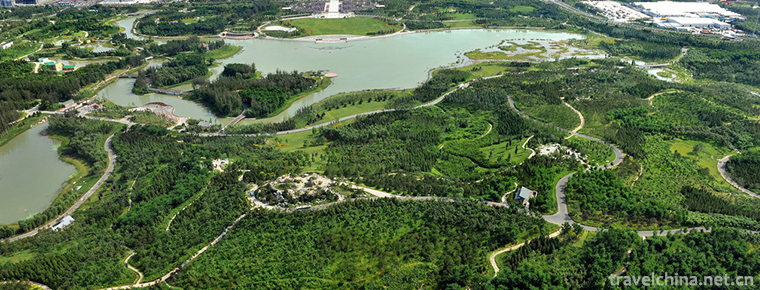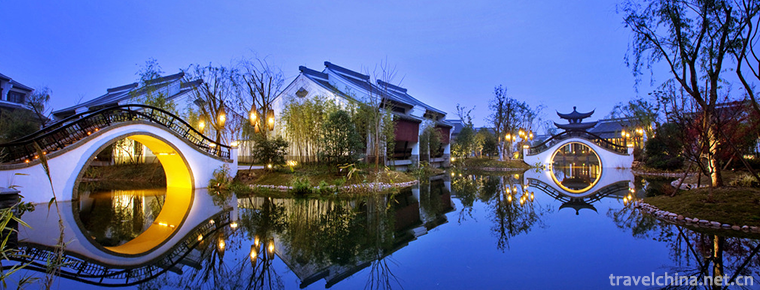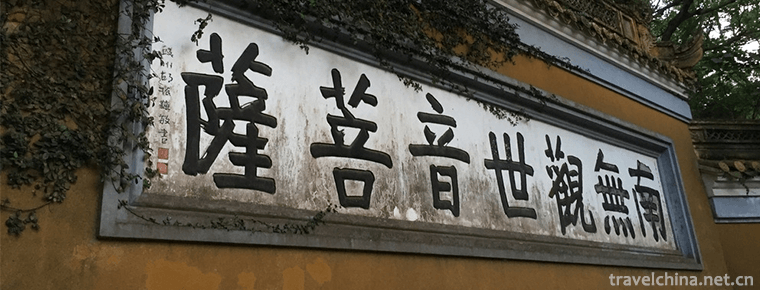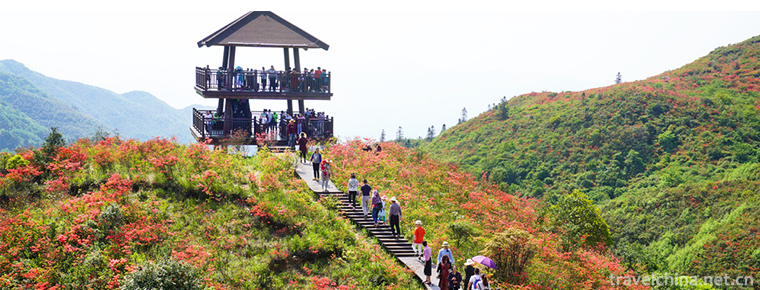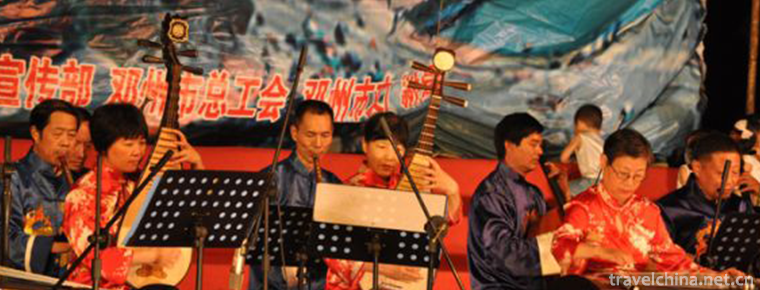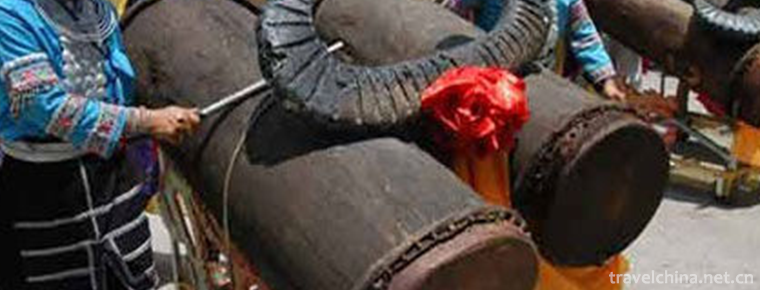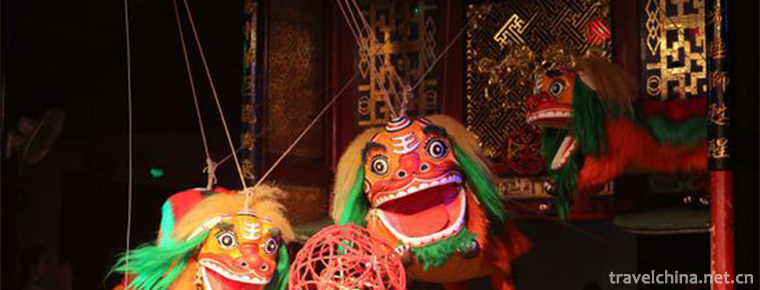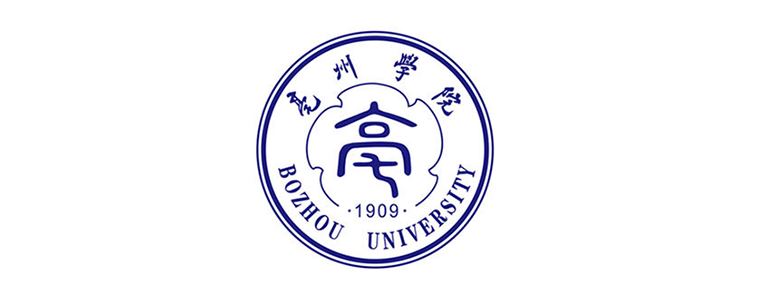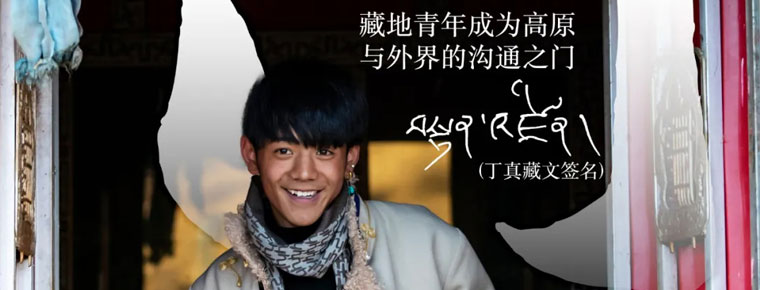Zhuang Drama
Zhuang Drama
Zhuang Opera, a local traditional drama in Guangxi Zhuang Autonomous Region, is one of the national intangible cultural heritage.
Zhuang opera is also called "Zhuang opera". In the old times, the Zhuang people called themselves "Bhutto", which means "indigenous people" and "local people". They called Zhuang opera "Chang Tuo", or "Tu opera", which is different from the Han opera. Zhuang Opera is developed on the basis of Zhuang folk literature, singing and dancing, and rap and singing skills. It can be divided into Guangxi Zhuang Opera (North Road Zhuang Opera, South Road Zhuang Opera, Zhuang Poetry Opera) and Yunnan Zhuang Opera (Funing Zhuang Opera, Guangnan Zhuang Opera) according to different dialects, musical singing, performing styles and popular areas. The performances are mostly performed in the local Zhuang dialect with rich tunes.
On May 20, 2006, Zhuang Opera was approved by the State Council of the People's Republic of China to be included in the first batch of national intangible cultural heritage lists.
historical origin
As Zhuang Opera is composed of seven different kinds of plays, it has complexity and diversity that other operas do not have. In this case, the development of Zhuang Opera was not developed by the time inheritance of a certain opera, but by the combination of different operas in this parallel form.
Zhuang Opera began to take shape in the early Qing Dynasty. In the mid-Qing Dynasty, it had its own writers, scripts and theatre troupes. Yongzheng period has been relatively mature.
In the reign of Tongzhi and Guangxu in Qing Dynasty, Beilu Zhuang Opera was first called Bench Opera, which originated from folk songs, singing poems and folk art. It was originally a form of sitting and singing among the Zhuang people. After work, two or three people sit on the bench and sing stories.
In the reign of Kangxi in the Qing Dynasty, the handwritten version of Taiping Spring in the Central Baiping Dialogue was a bench opera version.
In 1765 during the reign of Qianlong, Tianlin County organized the Longcheng Class to perform on the stage the song book "Farmer's Baotie" compiled by the central Baiping tune, which was the earliest organized performance of the Northern Road Zhuang Opera.
Later, in 1815, during the Jiaqing period of the Qing Dynasty, a semi-professional local opera troupe of Zhuang Opera appeared in the southern part of the Zhuang nationality. At that time, local opera artists had passed on for seven generations.
Huang Yonggui, the seventh generation of class master, once participated in the Cantonese Opera Club in Nanning. During this process, he copied more than 60 Cantonese opera scripts. After returning home, he cooperated with Liao Falun, the fifth generation of class master, to translate the scripts into Zhuang language and perform them in the form of local language. He also set up Luoyang Opera Club and became the representative of Beilu Zhuang Opera. Huang Yonggui compiled a grand drama "Yizhigao" in praise of the national heroes of the Zhuang nationality according to the plot of the chapter novel "Five Tigers Pingnan". At most, 64 actors performed on the same stage, which laid the foundation of the Northern Road Zhuang Opera and flourished.
Nanlu Zhuang Opera was first formed in Qingdaoguang period. In his early years, Huang Xianjing, a Mayao native, lived in Nanning and worked as a partner in the Yong Opera Troupe. When he returned home in 1845, he brought Yong Opera back to his hometown and organized a group to perform, which was called Ma'ai local opera. At the beginning, they sang in Chinese, but because the actors could not speak Chinese, they were singing in the background by their teachers, and the actors performed in the double-reed form in the front stage.
Before and after the Revolution of 1911, the Southern Road Zhuang Opera gradually developed into a form of singing and doing in one. It changed to sing local folk songs and singing in Zhuang language, but still retained the habit of backstage ci-poems. After the founding of the People's Republic of China, it absorbed the popular local Zhuang puppet singing tunes, which enriched the singing tunes of the South Road Zhuang Opera.
Shigong Opera of the Zhuang Nationality is called Poetry Opera, Singing Poetry, Zhuangshi and Tuning Teacher in the Zhuang Nationality. It mainly spreads in Hechi, Yishan, guests, Guixian, Shanglin, Wuming, Yongning, Liuzhou and Baise. It is a kind of folk opera developed on the basis of Shigong Opera.
The dance of Shigong Opera itself is the action of the God of music. "Shigong" is a wizard, singing and dancing to amuse the god, which is called "Nuo". At the beginning, Shigong wore red clothes and wooden masks while performing, and then replaced them with paper face paintings. After 1911, Shigong removed the masks and began to make-up performances.
Yunnan Zhuang Opera includes two branches: Tuju Opera and Shaju Opera. The former is represented by Funing Zhuang Opera, while the latter is represented by Guangnan Zhuang Opera. In the past, people called Funing Zhuang Opera and Guangnan Zhuang Opera "local opera".
Funing local opera has a history of nearly 300 years. It is mainly popular in Chengguan, Yichao, Peeling Pass, Naneng, Dongbo, Zhesang, Banlun, Huajia, Gula, Ayi, Langheng and other townships in Funing County. There were more than 100 amateur opera troupes in its heyday. Funing Zhuang people call performing Zhuang operas "bundling and mounting". Free translation into Chinese is the "essentials of Tu people".
Guangnan Zhuang Opera is popular in the area of Guangnan where the Sha ethnic group of the Zhuang tribe lives in Wenshan Zhuang and Miao Autonomous Prefecture of Yunnan Province. Formerly known as Sha opera or Sha opera, Sha opera was developed from Sha's song and dance under the influence of Han opera. It is divided into North Road Sha opera and East Road Sha opera, which were formed in the Qing Dynasty.
The emergence and development of Zhuang Opera went through several ups and downs: in Qianlong period, a performing class club was formed, and in Guangxu period, the Northern Road Zhuang Brush reached its peak, but then it declined rapidly.
Cultural characteristics
Music for voices in a Chinese Opera
Since the Zhuang Opera is composed of seven kinds of plays popular in the living areas of the Zhuang people,
Therefore, the aria of Zhuang Opera is also complex and changeable, not a unified model.
The musical aria of Beilu Zhuang Opera belongs to the form of syntheses. The aria mainly includes the right tune, flat tune, divination tune, Mao Cha tune, scolding board, hate board, crying tune, sad tune and so on. Some roles have specific arias. In addition to the right tune, there are several singing tunes for different roles, such as "Wugong Tune" for warriors, "Old Man Tune" for the elderly, and "Clown Tune" for clowns.
South Road Zhuang Opera includes Zhuangs Puppet Puppet Show and Maaizhuang Opera. The singing tones mainly include flat panel, sigh, flower picking, happy tune, high-pitched, crying tune, cold tune, poem tune, etc. In the performance of the Southern Road Zhuang Opera, the form of "one singer, all the people and" is also adopted. The actors sing on the stage and the band sings in the background. Bangqiang is mostly used as the lining and dragging at the beginning of the first sentence and the end of the aria. The last sentence is the whole Bangqiang of the second sentence. This kind of assistant technique has strong artistic effect in creating stage atmosphere, setting off plot environment, revealing and rendering characters'inner feelings, etc.
The main singing tone of Zhuang Opera is called the main tune. The female role sings with the word "quick brother" which means "quick brother" and the male role sings with the word "Yi Ali", which means "where is the sister", obviously with the flavor of Zhuang love song.
The lyrics in the main arias of Zhuang Opera maintain the unique rhythm structure and rhyme form of traditional folk songs of the Zhuang nationality. The so-called "waist-foot rhyme" means that the last word of the previous sentence rhymes with the second or third word of the next five-word sentence, and the fifth word of the seven-word sentence rhymes with each other.
Music
The music tunes of Zhuang Opera are full of the flavor of Zhuang folk songs, and each tune is accompanied by a combination of acts. Major is used to accompany Xiaodan's singing. The melody is euphemistic and elegant. Most of the music is composed of sixteen notes. The first sentence of the tune is the main part of the whole song. Counter-tone is used to accompany Wusheng in battle. It has a strong rhythm. It mostly uses octave and quadruple notes, but seldom uses sixteen. Sand tune is the accompaniment of Xiaosheng when he comes on stage. There are more minute notes with octave and dichotomy. Crossing tune is the accompaniment of Danjiao walking, Danjiao walking dance body, with a fan covering the face, step by step to half squat. This tune can also be said to be a dance accompaniment, gorgeous, beautiful and moving. Sometimes the emperor appeared with the accompaniment of a passing tune. Crown tone can only be used when the emperor appeared, mostly octaves and sixteen notes, gently turning to listen, very soft.
Musical Instruments
The accompaniment instrument of Zhuang Opera is mainly Ma Gu Hu, which uses horse leg bone as the piano tube and metal strings. It is slender and longer than Beijing Hu, and its timbre is clear and bright. The instruments are Tuhu, Huluhu, Erhu, Sanxian, Shaoguan or flute. Sometimes wood leaves are played as auxiliary instruments. In addition, percussion instruments such as wooden fish, small drums, cymbals, star gongs and high-edged gongs are also played. Among them, the bee drum of Shigong Opera is the most distinctive, with deep timbre and sound like urn.
The accompaniment music of Zhuang Opera usually adopts multi-voice technique. Different instruments have different chords and form various harmony relations in melody. It is interesting to play.
North Road Zhuang Opera is mainly accompanied by Ma Guhu, Hulu Hu and Yueqin; South Road Zhuang Opera is accompanied by Qinghu, Houhu and Xiaosanxian; Zhuangshi Opera is accompanied by bee drum, gong, cymbal and membrane-free flute; Funing Zhuang Opera is accompanied by Tugong, Tugu, mistake, cymbal and Tuerhu, Tusanxian, flute, Suonao, etc. Musical Instruments.
The accompaniment instruments of Guangnan Zhuang Opera are Huqin, Erhu, Sanxian, Yueqin and so on. Percussion instruments include crisp drums, big drums, milling gongs, big gongs, cymbals and trumpets.
Acting skills
The performances of Zhuang Opera on North and South Road have their own characteristics. In the performances of the North Road Zhuang Opera, Sheng and Dan all use fans, while Xiao Sheng and Huadan use group fans for ugly performances and fold fans for ugly performances. There is also a division of roles in the performance of Nanlu Zhuang Opera. Flower faces are divided into big and small ones. Xiaosheng has Wensheng and Wusheng. Danjiao has Zhengdan, Wudan and Laodan. In the early stage of Shigong Opera, there were 72 kinds of masks, each representing a class of characters with its own typical stature. Later works such as "Red Bronze Drum", "Night Pearl", "Rose", "Bird's Clothes" and "Song of Water Turbine Pump" won the audience's praise. Zhuangshi opera began with red clothes and wooden masks, then changed to costumes.
The performance of Guangnan Zhuang Opera has the traditional performance formula of "Wen Bu Fan, Wu Bu Dao, Side Stand Out, Show Up in Taichung, First Rite, Then Sing, Admission". The program of "Shang Yingtai" for civil servants approached that of "Pai Chao" for Han operas, and that of "Shang Dangtai" for Wu Jiang was similar to that of "Pushing Shirts" in the early stage of Yunnan Opera.
Prop
The performances of Guangnan Zhuang Opera are characterized by strong dancing, with fans as the main props, group fans for students and folding fans for once.
Before the performance of Guangnan Zhuang Opera, the class leader held the opening ceremony. Set up a scent case in the background, burn incense 3 bing, drink 3 cups, dedicate the God of opera, read words in the class master's mouth, pray for the success of the performance, beg gods to bless the whole village people Anzhuwang, Wugu Fengdeng, the end of the performance, in the same form.
The performances of Guangnan Zhuang Opera are usually built on the earth platform or temporary stage with stone slabs and wooden boards on the square, with a large canopy on the top and a horizontal screen separated from it, which is divided into two parts, the front stage and the back stage. Kirin, dragon and Phoenix are painted in the horizontal screen, and door curtains are hung on both sides. Lotus, pomegranate and longevity stars are painted on the curtain. There is a desk in the background for Lao Lang Shen's tablet. There are suitcases, helmet, handlebars on both sides, one desk and two chairs in the front desk, left in the literary arena and right in the martial arts arena, and the theatre master sits behind the desk to prompt his lines and direct the performance.
Representational repertoire
The themes of Zhuang Opera mostly reflect the national life content, such as Buber, Nong Zhigao, Sister Zhang's going down to earth, Baohulu, Red Bronze Drum, Golden Flower and Silver Flower, Buya, Wenlong and Shawney, Liu Er Dafan, Mao Dawang, Baibirdcoat, White Horse Girl, Night Pearl, Rose and Water Wheel Pump. Songs of Songs, Jiejiu, Shuangzhuangyuan, Shuanghua Pair, Niulang, Shunzhiqiaohai, Snail Girl, Changing Buffalo, Great Change of Poor Mountain, Blind Shop, Li Yuanqing Biao, Xue Pinggui, Jinshapa, Wannianshu and Tortuous Waterway, etc.
Distribution area
Zhuang Opera is mainly composed of seven kinds of traditional operas popular in the Zhuang nationality. They are Dejing Puppet Opera, Ma'ai Zhuang Opera, Tianlin Zhuang Opera, Funing Zhuang Opera, Guangnan Zhuang Opera, Longlin Zhuang Opera and Shigong Opera.
Dejing Puppet Opera is popular in Jingxi, Debao, Ma'ai Zhuang Opera is popular in Jingxi, Debao and Napo; Tianlin Zhuang Opera is popular in Tianlin, Lingyun, Yueye, Baise and other areas of Western Guizhou; Funing Zhuang Opera and Guangnan Zhuang Opera are popular in Wenshan Funing County; Longlin Zhuang Opera is popular in Longlin; Shigong Opera is popular in Wuming, Hechi, Yishan and Lai. Bin, Guixian and other places.
The performances of South Road Zhuang Opera are mainly distributed in Jingxi, Debao, Napo, Tiandu, Daxin, Tianyang, Tiandong and other counties. The performances of North Road Zhuang Opera are mainly distributed in Tianlin, Xilin, Longlin, Lingyun, Yueye, Funing and Nannan counties in Guangxi.
Inheritance and Protection
Inheritance value
Zhuang Opera, rooted in the soil of national life, is a drama with a long history and unique characteristics created by the Zhuang people, and a bridge for ethnic cultural exchanges in Southeast Asia.
As a comprehensive artistic form, Zhuang Opera almost integrates the original ecological culture of the Zhuang nationality with its theme, music, singing and performing skills, and displays it through the artistic image of the stage. It has become an important carrier of the treasure house and inheritance of the culture of the Zhuang nationality.
Zhuang Opera is developed on the basis of folk song and dance and folk religion art of the Zhuang nationality. It has gone through several stages of development from entertaining gods and gods to entertaining people. Its singing is also a process from folk song minor, sitting and singing to acting as a role. At the same time, it also absorbs the artistic nutrients of the local operas of the Han nationality, which is a vivid expression of the national cultural exchanges and has a positive value for the study of the development history of Chinese minority drama.
Current situation of inheritance
Due to the accelerated progress of modernization, Zhuang Opera has been impacted by multiculturalism and strong culture, and its survival has been in crisis. The younger generation pursues fashion, regards Zhuang Opera as a local custom, and their enthusiasm for appreciating and inheriting traditional national culture has declined sharply. With the death of the veteran performers of Zhuang Opera, the inheritance of Zhuang Opera in many places appeared dynastic, and this characteristic opera began to disappear naturally. The timely rescue and protection of Zhuang Opera has become an important task that can not be ignored.
Heritage figures
Zhang Qinyin, female, Zhuang nationality, born in 1933, Debao, Guangxi. The second batch of national intangible cultural heritage project representative successors, Guangxi Zhuang Autonomous Region declared. Declaration items: Zhuang Opera.
Bi Kejian, male, Zhuang nationality, born in Tianlin, Guangxi in 1936. The second batch of national intangible cultural heritage project representative successors, Guangxi Zhuang Autonomous Region declared. Declaration items: Zhuang Opera.
protective measures
Government support
The local government of Tianlin has included the protection, inheritance and development of Zhuang Opera in the 11th Five-Year Plan. Since 2007, Tianlin County has held an annual Zhuang Opera Festival (renamed after 2015 as "Howling and Daring" Zhuang Opera Festival). The Festival is not only a grand event of Zhuang Opera, but also an incentive mechanism to promote its development. Through the performance evaluation of excellent troupes, excellent repertoires, excellent actors, excellent directors, stimulated the creative enthusiasm of directors and directors, attracted more fans to participate in the activities of Zhuang Opera, and promoted the popularity and development of Zhuang Opera.
Tianlin County has invested more than 15 million yuan in supporting funds for the construction of urban and rural theatres, and built 96 theatres covering all townships in the county, providing hardware facilities for various theatre troupes to carry out their activities. It has invested 350,000 yuan in personnel training and held training courses every year to improve the performance level of amateur Theatre troupes and train qualified performers of Zhuang Opera. In addition, the county government has included the funds for supporting amateur theatre troupes in the county budget to provide additional costumes, musical instruments and props for the troupes to solve the problems of the troupe activities; the government has invested 3 million yuan annually to hold the Zhuang Opera Arts Festival; in 2017, the government has also dedicated 2 million yuan to supporting the compilation and promotion of the Zhuang Opera "Sacrifice to Yao Niang".
Education and training
Tianlin County strengthens the construction of Zhuang Opera Counseling Team. At present, the number of Zhuang Opera Counselors who can play an independent role in the county has grown to 20, with an average of 678 counselors going to the countryside every year. At the same time, Tianlin County has also set up a Zhuang Opera Art School, which has intensified the training of talents. Since 2015, the county has held six performance training courses, with more than 1200 participants. In order to facilitate teaching, Tianlin County also organized experts to compile "Guangxi North Road Zhuang Opera Course" as a teaching material for popularizing and improving the art of Zhuang Opera, for the study and guidance of various troupes and schools of Zhuang Opera Art.
Since 2010, primary and secondary schools in Tianlin High School, Leli Small School, Leli Small School, Leli Town Central School, Lizhou Central School, Bagui Central School, Dingan Central School and Jiuzhou Central School in Guangxi Zhuang Autonomous Region have introduced Zhuang Opera culture into the campus. Through the activities of introducing opera into the campus, students'interest in the art of opera has been cultivated.
social influence
Important festivals
In 2007, the People's Government of Tianlin County, Guangxi Academy of National Culture and Art and Guangxi Research Center for Intangible Cultural Heritage jointly organized the "Academic Seminar on the Protection of Zhuang Opera Art and Intangible Cultural Heritage". Many experts and scholars in China participated in the seminar, and discussed the history, artistic characteristics, living conditions, protection, inheritance and Development Countermeasures of Beilu Zhuang Opera.
From the late 1950s to the early 1960s and in the early 1980s, the census and investigation activities of the Northern Road Zhuang Opera were carried out in the whole region. In 2007 and 2008, the government of Tianlin County planned the Northern Road Zhuang Opera Culture and Art Festival of Tianlin County and the Northern Road Zhuang Opera Culture and Art Festival of Guangxi respectively. At the same time, scholars from all over the country were invited to discuss the Northern Road Zhuang Opera.
Important performances
In May 2003, Xiaozhuang Opera "Nine Grades Official Banquet" participated in the International Competition of Xiaozhuang Opera in Boxing, Shandong Province, and won the gold medal.
In 2015, Xiaozhuang Opera "Lingyan Opera Tiger" participated in the Fourth National Minority Drama Performance in China and won the Excellent Drama Award.
In August 2018, Yao Niang, a large-scale Zhuang opera, participated in the 10th Guangxi Drama Exhibition and won the Osmanthus Bronze Award.
From November 5 to 6, 2017, Feng Zicai, a Zhuang opera created by Guangxi Drama Academy, appeared at the Shanghai International Art Festival.
In April 2018, Feng Zicai, a Zhuang drama created by Guangxi Theatre, participated in the selection of the 28th Shanghai Magnolia Drama Award.

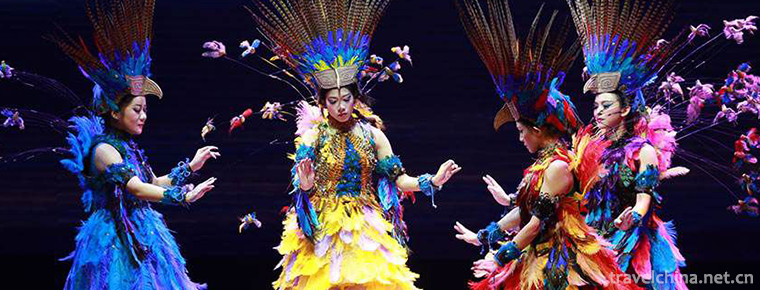
-
Baiyun Mountain
located in Baiyun District of Guangzhou City, Guangdong Province.
Views: 164 Time 2018-10-12 -
Beijing Olympic Park
Beijing Olympic Park Located in Chaoyang District of Beijing, Beijing Olympic Park is located at the north end of the central axis of Beijing.
Views: 178 Time 2018-11-24 -
Xixi National Wetland Park
Xixi National Wetland Park is located in the west of Hangzhou City, Zhejiang Province. It is only 6 kilometers away from Wulin Gate, the main city of Hangzhou, and 5 kilometers away from West Lake..
Views: 185 Time 2018-12-07 -
Putuo Mountain Scenic Spot
Putuo Mountain Scenic Spot, located about 100 nautical miles east of Hangzhou Bay, Zhejiang Province, is an island in Zhoushan Islands. The island covers an area of 12.5 square kilometers.
Views: 157 Time 2018-12-07 -
Daweishan National Forest Park
Dawei Mountain is located in the boundary between Hunan and Jiangxi Province, the hinterland of Lianyun Mountains, the East is Tonggu County under the jurisdiction of Yichun City, Jiangxi Province.
Views: 125 Time 2019-01-07 -
Silk Strings of Laohekou
Laohekou Silk String is a traditional folk music in Xiangyang City, Hubei Province. Laohekou Silk String is different from other forms of folk literature and art. It is a music that combines folk arti.
Views: 289 Time 2019-05-11 -
Wooden drum dance
Wood drum dance is a kind of folk dance that is spread among the Miao, Yi and Wa people in southwest China to dance and sacrifice by beating wood drum. Its drum shape is mostly to intercept the trunk .
Views: 199 Time 2019-06-06 -
Ningde Huo Boy Line Lion
Ningde Huo children's lion is a traditional folk culture, which controls the lion's movement and expression through silk thread. Line lion is mainly pulled by head rope, tail rope and parotid rope, so.
Views: 73 Time 2019-06-08 -
Bozhou University
Bozhou College (Bozhou University), for short, is located in Bo Yuan. Anhui Province Bozhou City By the state Ministry of Education Approved full-time full-time undergraduate institutions..
Views: 152 Time 2019-11-08 -
Zigong Salt History Museum
Zigong Salt History Museum is located in the center of Zigong, Sichuan Province. It was built in 1959. It is one of the earliest professional museums in the history of Chinese museum development. It is still the only Museum of salt history in China. On May 18, 2017, it was promoted to the third batch of national first-class museums. .
Views: 166 Time 2020-10-15 -
About Ding Zhen Video
In November 11th CCTV news and Oriental tiktok were put on a short video of the tremble. Ding Zhen, the "sweet boy" in the video, triggered a phenomenal network event with a transmission volume of more than 5 billion times. At the same time,.
Views: 136 Time 2020-12-06 -
Dazhou hydrology
The rivers in Dazhou city mainly belong to the Jialing River water system, which is a tributary of the Yangtze River. It originates from Daba Mountain and distributes in the form of branches from north to south. Qianhe River, Zhonghe River and Houhe Riv.
Views: 171 Time 2020-12-20

